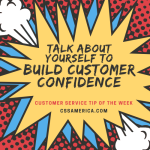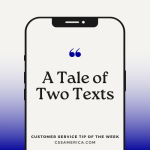The Chicago Cubs baseball team is doing better on season ticket renewals this year. According to VP of Sales and Partnerships, Colin Faulkner, “The rate of renewal for full-season and “combo” night and weekend game plans is in the mid-80 percent range, up 5 percentage points compared with this point last off-season.” And to what does Faulkner attribute the improvement? “Better customer service.”
They went through a restructuring of their ticket sales department to provide more dedicated resources to retention. There were a couple other points made in the article, but let’s stick with this one – structuring yourself (with dedicated resources) around retention.
You can often tell what’s important to an organization based on how they spend their money and utilize their resources. We also believe that creating a culture that moves you toward a goal requires much more than leaders who give good speeches or incentives to change behaviors. Culture change and the benefits that can result often require change in how a business is organized, how personnel are allocated, and how focused are the responsibilities of those personnel.
Whether you work in the sports industry or not, when you’re looking to hit a home run with a culture change or to dramatically impact some key business outcome, don’t just create a new incentive program or give a great speech. Make a structural change that ensures you have resources dedicated every day to focus on the goals and to execute the strategies to get there.
Ensure you’re structured for success.
Did you like this post? Here are other Sports-related posts:





















